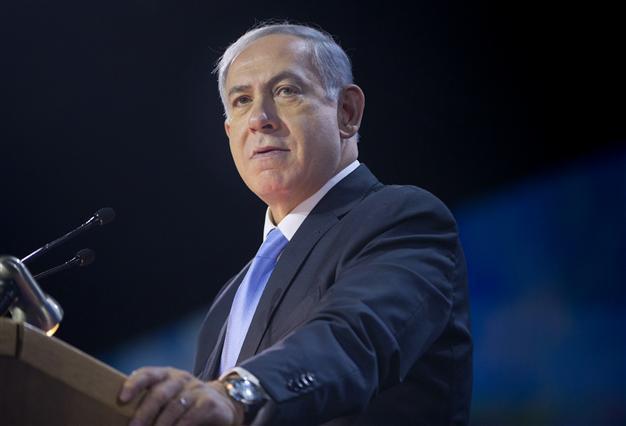Netanyahu takes fight against Obama's Iran plan to Congress
WASHINGTON - Agence France-Presse

Israeli Prime Minister Benjamin Netanyahu speaks at the American Israel Public Affairs Committee (AIPAC) Policy Conference in Washington, on March 2, 2015. AP Photo.
Israeli Prime Minister Benjamin Netanyahu goes to Capitol Hill on March 3 for another round in an increasingly heated battle with the White House over Iran's nuclear ambitions.In a landmark speech to Congress, Netanyahu will seek to mobilise lawmakers to oppose an emerging deal with Tehran which is backed by President Barack Obama.
Obama on Monday lashed out at his nemesis, pointing to Netanyahu's attacks on a previous interim US-Iran deal that paved the way for this week's ongoing talks in Switzerland.
"Netanyahu made all sorts of claims," he told Reuters.
"This was going to be a terrible deal," he went on. "This was going to result in Iran getting $50 billion worth of relief. Iran would not abide by the agreement. None of that has come true."
Netanyahu aides say that in his address he will present information proving that the shape of the deal being discussed in Switzerland this week presents grave danger.
State Department spokeswoman Marie Harf warned Monday that if the details came from US briefings to Israel, revealing them could mean there would be no more.
"We've continuously provided detailed classified briefings to Israeli officials to keep them updated and to provide context," she said.
"Any release of any kind of information like that would, of course, betray that trust."
"We want to keep talking in these settings, of course, but that would be a problem."
Netanyahu believes that in the talks with Iran the so-called P5+1 group is verging on striking a deal that will ease international sanctions without the ironclad safeguards the Jewish state says are essential to deny Tehran a nuclear bomb.
The US administration says that is just not true.
"This president has made clear that he's not going to sign a bad deal," White House spokesman Josh Earnest said on Monday.
Samantha Power, Washington's ambassador to the United Nations, weighed into the fight on Monday when she addressed 16,000 pro-Israel activists in the US capital.
"The United States of America will not allow Iran to obtain a nuclear weapon, period," she said. Taking the podium shortly after Power, Netanyahu remained unswerving in his opposition to Obama's policy.
"The purpose of my address to Congress tomorrow is to speak up about a potential deal with Iran that could threaten the survival of Israel," he said.
"My speech is not intended to show any disrespect to President Obama," he told the lobby group AIPAC's annual conference.
"Israel and the United States agree that Iran shouldn't have nuclear weapons. But we disagree on the best way to prevent them from developing those weapons."
The row is not only about the core issues but also about the way Netanyahu and US Republicans are waging the battle.
He was invited by Speaker of the House John Boehner, a Republican, and he accepted with neither party informing the White House.
Netanyahu himself is running for a third consecutive term -- which would be a fourth overall -- in an Israeli election on March 17.
"Our commitments to our partnership with Israel are bedrock commitments rooted in shared fundamental values cemented through decades of bipartisan reinforcement," Power said.
"This partnership should never be politicised."
The Israeli leader's lobbying expedition to Washington came as US Secretary of State John Kerry was in Switzerland for talks with his Iranian counterpart on what would be an historic deal.
But Netanyahu denied that his action had harmed the traditionally close US-Israeli alliance.
"Reports of the demise of the Israeli-US relations are not only premature, they're just wrong." Kerry and Iranian Foreign Minister Mohammad Javad Zarif met in a lakeside hotel for a series of sessions which are scheduled to stretch into Wednesday afternoon.
The pace of the negotiations meant to rein in Iran's suspected nuclear arms program in exchange for sanctions relief has gathered pace as a March 31 deadline nears.
Mark Heller, a political analyst at Israel's Institute for National Security Studies says that after years of warning about the danger of a nuclear-armed Iran, it is hard to imagine what new angle Netanyahu will pursue on Tuesday.
"He's been over this ground before many times and expectations have been built up to the point where if he doesn't come up with something truly explosive. it's going to be a big letdown," he told AFP.
"I think he's going to have to pull some kind of rabbit out of the hat and reveal some information that's not out there in the public domain; otherwise he'll just be preaching to the converted."
















